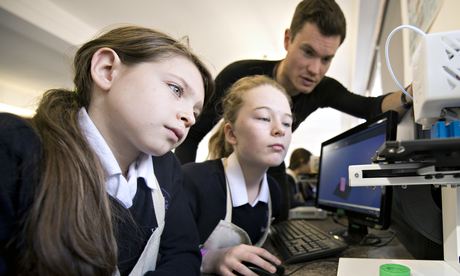They haven't hit a glass ceiling or discovered their junior male colleague is earning more than they are. They haven't lost their job after taking maternity leave or been frustrated by a lack of female executives or women in the cabinet. But they are growing a bit weary of pink; know that magazines airbrush celebrity bodies; don't like boys getting away with worse behaviour in class; and might like to play football.
The pre-teen feminist is here.
Last month, one of the UK's bestselling comics for girls, Girl Talk, declared itself feminist. Editor Bea Appleby admits the magazine's "girls are amazing" campaign was a risk but says the response has been overwhelmingly positive. "We're promoting the feminist values – equality, sisterhood and empowerment and making the magazine a safe place [that] girls can learn to be proud of who they are and meet great role models. I didn't think it was right that all our readers would see were pop stars and models; we've had an article on Malala Yousafzai and we're encouraging them to think about what's equal and what's not.
"They are pretty aware, actually, they say things about what happens in schools, that it's the girls who are asked to tidy up and the boys get away with bad behaviour. I think schools are being a bit rubbish in tackling sexism, a lot are entrenching stereotypes quite casually." Appleby admits that there is no way Adriana Grande or Katy Perry are leaving the cover slot for Malala or Marie Curie just yet, and pink is still the rallying colour for her 10-year-old readers, but it's a powerful start.
"It's a really exciting time for young feminists," says Sophie Bennett of the group UK Feminista, which successfully campaigned to "lose" lads' mags in high street shops and has started lobbying schools to tackle casual sexism, asking headteachers to sign its Schools Against Sexism pledge. "There's been a huge upsurge in the number of feminist groups in schools, colleges and universities. A new generation of girls are standing up against sexism and demanding change."
She says there has been a rise in demand from school-age children and their teachers for UK Feminista's workshops on gender equality. Since UK Feminista was set up in 2010, interest from younger girls has soared, with more than 100 young people contacting the organisation last year looking for help to set up a group in their school.
"We've worked with trainee teachers around the country, enabling them to tackle sexism and damaging gender stereotypes in their classrooms. Schools have a crucial role to play in addressing harmful attitudes," says Bennett.
The education establishment was last week warned by Hannah Webster, speaking for the Independent Association of Prep Schools, that they were not doing enough. "Forcing girls to wear pink is wrong and could harm their future," Webster writes, saying it "beggars belief" that toys are colour-coded. She says that girls are told their role is to be "pretty and frilly", while boys must be "virile" and take charge.
But the idea of having blue for a boy and pink for a girl is pernicious because it leads them towards roles, regardless of their true identities.
Writing in Attain magazine, she says: "If we designate a particular colour to a gender, it leads us to designate all manner of other things by gender, too. The result is girls and boys read different kinds of books, play with different kinds of toys, study different subjects, consider different occupations, have different roles within the workplace and family, and are ultimately valued differently by society."
Pink is the new red flag for parents, with three campaigns against sexist labelling. Two mothers set up Pinkstinks in 2008 to protest against sex-segregated toys and now it has been joined by Let Toys Be Toys, demanding shops remove "boys" and "girls" segregated toy departments – Marks & Spencer has now pledged to make toys "gender neutral"; and Let Books Be Books, backed by children's laureate Malorie Blackman and author Philip Pullman. The latter want publishers to "stop labelling books, in the title or on the packaging, as for girls or for boys". Former children's laureate, Anne Fine, says it is "exasperating" that "false and stupid assumptions about what each gender 'wants' are back in force, narrowing the horizons and possibilities for children".
"You'd think this battle would have been won decades ago. But even some seemingly bright and observant adults are buying into it again – quite literally buying into it in the area of 'pink for girls and blue for boys'," says Fine.
Usborne, which publishes a pink, flowery Girl's Activity Book and robot-blue Boys' Activity Book – says the plan to "discontinue publication of titles such as these was decided some time ago".
Research commissioned by Girlguiding UK found that two-thirds of girls believe women are still judged more on their looks than their ability, and one in three would consider plastic surgery to improve her experience. Its new chief executive, Julie Bentley, took up her post last year describing the Guides as the "ultimate feminist organisation".
"Celebrity culture makes them feel under pressure to look a certain way – look at the results of our study. Confidence, self-esteem and inner belief is going to determine what they do with their lives, not looking nice," she says.
The Guides have a new badge: the Free Being Me badge which, at Brownie level, will have girls exploring why they are portrayed as princesses, and learning that magazine images aren't necessarily real.
In the US, the magazine Seventeen, with a readership that starts at age 12, brought out a "girl power" issue in March, listing "the 17 most powerful girls under 21" – although its chart of success was criticised as being one of fame and wealth. But role models for younger girls have come from their own age group. Like 12-year-old Madison Kimrey, who recently made headlines in the US after she took on two major political figures: North Carolina governor Pat McCrory, who dismissed teenagers in a speech against pre-registering them to vote; and the lawyer, anti-feminist and conservative activist Phyllis Schlafly, who last month addressed the wage gap between the sexes by saying women who are paid the same as men won't find husbands.
"What you're doing is attempting to limit my choices," responded pre-teen Kimrey. "Let's get one thing straight. When I'm thinking about what kind of career I want to have, it's a lot like shopping for a bra. I want to find something that fits me and appeals to me, and I'm not thinking about pleasing a man."
In her open letter to Schlafly, Kimrey namechecks Yellowberry, a bra company run by teenager Megan Grassell, who started the company because she couldn't find age-appropriate bras in shops. Even girl champion Michelle Obama has now released an inspirational video address on the subject: "I believe that girl power is about being the very best version of who you are," she says. "And that means showing up for class, paying attention – it means really challenging yourself.
"As I always tell my daughters, a good education is something no one can take away from you."
Bestselling author Steve Biddulph writes in his book, Raising Girls: ''To understand our daughters, we have to realise that their childhood is not like ours. To put it bluntly, our 18 is their 14. Our 14 is their 10. Never before has girlhood been under such a sustained assault, ranging through everything from diet ads, alcohol marketing and fashion pressures, to the inroads of pornography into teenage bedrooms.''
Now the fightback may have begun. But Emily Maguire's book, Your Skirt's Too Short: Sex, Power, Choice, remains one of the few feminist tracts aimed at a younger age, and while the latest Disney film, Frozen, has been applauded for its heroines who aren't reliant on a prince for rescue, parents still face an uphill struggle against the mass of pink-tinged advertising, cartoons, toys, clothing and stereotyping that is engulfing children.
Interviewed about her blog Teen Feminist, 13 year-old New Yorker Jules Spector said last month: "Just because you're a girl, it doesn't mean people don't want to hear from you.
"They value your opinion, especially if you're young, because it's a whole new demographic they haven't necessarily heard from before, with new, innovative ideas."
Appleby admits it's early days. "Introducing feminist ideas to pre-teens, whilst keeping things commercially viable, is tricky. We're making small steps – not being radical."









